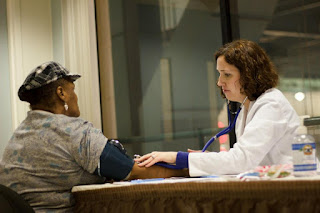I read an interesting article recently relating sleep to Diabetes.
We have been taught that sleep is important for our brain
function, but it turns out that sleep is also important for our fat cells. When
you feel groggy, your metabolism also feels 'groggy' and this can lead to
insulin resistance.
A recent study published October 16th, 2012 in Annals of Internal Medicine conducted by
the University of Chicago Medical Center professors indicated that a lack of sleep could also lead to obesity, type 2
diabetes, heart disease, stroke, and high blood pressure. This is the first
study involving sleep on a cellular level. It was a very small study with only
7 healthy young adults. They were randomly assigned to sleep either 8.5 or 4.5
hours a night for four nights and repeated these sessions in four week
intervals. After the four days, scientists measured how fat samples from their
abdomen processed glucose. The people who were sleep deprived had a 30%
reduction in their response to insulin. Their insulin levels were close to 3
times higher than the well rested participants. The high insulin levels suggest
that the pancreas was trying to compensate for the insulin resistance by making
more insulin. If this sleep deprivation cycle continued chronically, type 2
diabetes could develop. The next project for these researchers will involve
studying if treating sleep apnea in overweight people will improve their
metabolism.
Sleep may be another important lifestyle
modification that we will have to tell our patients about in the future.
However; since this was such a small study we will have to wait and see if it
will be verified by other studies. One researcher claimed that sleep should be
considered as important as diet when you are trying to prevent weight gain and
diabetes.
I summarized the information from this website:
















